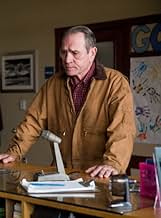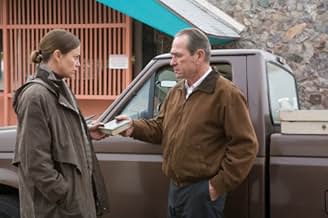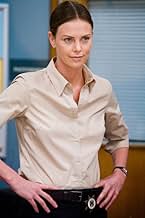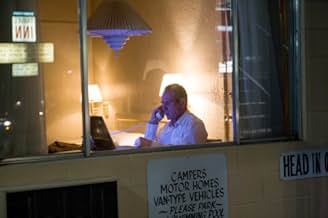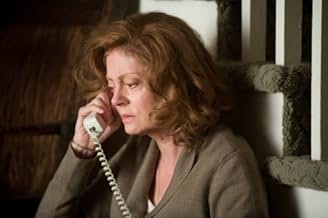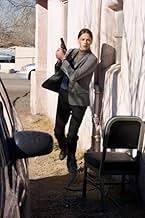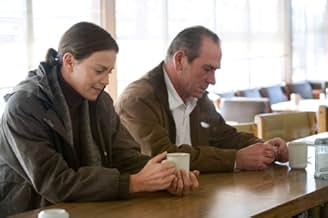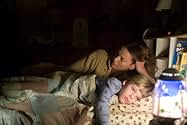NOTE IMDb
7,1/10
77 k
MA NOTE
Un enquêteur militaire à la retraite travaille avec un inspecteur de la police pour découvrir la vérité sur la disparition de son fils après son retour d'une mission en Irak.Un enquêteur militaire à la retraite travaille avec un inspecteur de la police pour découvrir la vérité sur la disparition de son fils après son retour d'une mission en Irak.Un enquêteur militaire à la retraite travaille avec un inspecteur de la police pour découvrir la vérité sur la disparition de son fils après son retour d'une mission en Irak.
- Réalisation
- Scénario
- Casting principal
- Nommé pour 1 Oscar
- 3 victoires et 21 nominations au total
Roman Arabia
- Private Robert Ortiez
- (as Victor Wolf)
Greg Serano
- Detective Manny Nunez
- (as Greg Serrano)
Avis à la une
This movie is just about perfect. I love how it starts as a genre movie and then transcends into something deeper and soul-searching. Some people just don't like Paul Haggis, but I'm not one of them. I think he's very smart here; he has no political point of view, he handles Charlize Theron perfectly, and the movie forces everybody to think about the troops in a way that isn't simply political rhetoric. I love that Tommy Lee Jones feels the way so many dads do. He's never been better. Watching the police work happen is interesting on it's own, but I like that Charlize Theron is just out to do the job correctly and just shrugs off the chauvinism coming at her from her department. The movie could've gone somewhere with that, but instead just quietly lets us in on it and moves on.
There have been many very good movies the last few years about Iraq-related themes, but I don't think there is a film that captures the feeling of the national mood as good as this one. It's drained of melodrama and just sort of moves forward on really good performances of the whole cast, who all act according to their natures instead of because of stupid plot requirements.
There have been many very good movies the last few years about Iraq-related themes, but I don't think there is a film that captures the feeling of the national mood as good as this one. It's drained of melodrama and just sort of moves forward on really good performances of the whole cast, who all act according to their natures instead of because of stupid plot requirements.
Only Roger Ebert and the reviewer for Rolling Stone seem to see the truth here: this film is slow and elegiac because it deals with heavy matters, but it is never boring, not if you understand the situation and the depth of feelings being explored. It's as if reviewers don't get it because they didn't really feel what the film is saying. Saying that there have been dozens of films about how war ruins men so it's a cliché, and that this one is too dreary and slow means that a person has stopped feeling for what is really hurtful, is even in denial. And that's the theme of this film: what happens when we lose touch with what's painful and don't care any more. The film is restrained but powerful, which is why it has such a strong effect.
Jones is wonderfully grim, with a face like a road map, as he explores what happened to his son. Charlize Theron is beautiful even though she is playing a woman who is forced to act as non-sexy as possible to get on in her job in a male police force. Susan Sarandon is not, as some critic said, "underused"; she gives a performance that is all the more powerful because it is restrained. This movie should be a must see for all who believe that the Iraq war should continue until there is an honorable time for America to leave. That time is already passed.
Jones is wonderfully grim, with a face like a road map, as he explores what happened to his son. Charlize Theron is beautiful even though she is playing a woman who is forced to act as non-sexy as possible to get on in her job in a male police force. Susan Sarandon is not, as some critic said, "underused"; she gives a performance that is all the more powerful because it is restrained. This movie should be a must see for all who believe that the Iraq war should continue until there is an honorable time for America to leave. That time is already passed.
And with the war still on, the theme of PTSD - Post Traumatic Stress Disorder - is topical and relevant. Shell shock, they used to call it. It is more than shells these days, of course - it is the killing of children and innocents which has an appalling and destabilizing effect on the young U.S. men and women soldiers engaged in Iraq.
Paul Haggis who has made Crash amongst other good films, tackles this difficult subject with sensitivity depicting the dehumanization of the soldiers who come home to an indifferent populace.
Hank Deerfield (played by Tommy Lee Jones) is a retired Vietnam veteran who investigates the disappearance of his son and comes up against the brick wall of military police. A sympathetic detective, Emily Sanders (played by Charlize Theron) slowly takes an interest in the case and negotiates with her superior officer to take the case back from the military police who want to brush it under the rug. When Mike Deerfield is found, dismembered and scattered, Hank commits himself to getting at the truth.
This film is not an anti-war effort but rather the facts are all presented, and one is left to come to one's own conclusions.
Tommy Lee Jones gives one of his best performances here, a relentless, humourless driven father, who has not been the best father, but doesn't rest until he finds the closure he desperately needs on the matter of the murder of his son.
Susan Sarandon was totally underused in the part of the mother of Mike, but the little we are shown of her is riveting.
Charlize Theron plays down her beauty to the degree that she wears bandages and bruises on her face through many of the scenes and ignores the rampant sexism of her unit. A great performance.
I didn't care for the Valley of Elah metaphor which is at the core of the movie itself. The David and Goliath story did not have a relevance to a story of PTSD and the horrific effects it has on both perpetrators and victims. So I am left puzzled at this symbolism. A little guy taking on a giant? Who would be the little guy? The Iraqis?
However, that vexation aside, for overall tension and the sheer watchability of Mr. Jones in a meaty role, this movie gets an 8 out of 10 from me.
.
Paul Haggis who has made Crash amongst other good films, tackles this difficult subject with sensitivity depicting the dehumanization of the soldiers who come home to an indifferent populace.
Hank Deerfield (played by Tommy Lee Jones) is a retired Vietnam veteran who investigates the disappearance of his son and comes up against the brick wall of military police. A sympathetic detective, Emily Sanders (played by Charlize Theron) slowly takes an interest in the case and negotiates with her superior officer to take the case back from the military police who want to brush it under the rug. When Mike Deerfield is found, dismembered and scattered, Hank commits himself to getting at the truth.
This film is not an anti-war effort but rather the facts are all presented, and one is left to come to one's own conclusions.
Tommy Lee Jones gives one of his best performances here, a relentless, humourless driven father, who has not been the best father, but doesn't rest until he finds the closure he desperately needs on the matter of the murder of his son.
Susan Sarandon was totally underused in the part of the mother of Mike, but the little we are shown of her is riveting.
Charlize Theron plays down her beauty to the degree that she wears bandages and bruises on her face through many of the scenes and ignores the rampant sexism of her unit. A great performance.
I didn't care for the Valley of Elah metaphor which is at the core of the movie itself. The David and Goliath story did not have a relevance to a story of PTSD and the horrific effects it has on both perpetrators and victims. So I am left puzzled at this symbolism. A little guy taking on a giant? Who would be the little guy? The Iraqis?
However, that vexation aside, for overall tension and the sheer watchability of Mr. Jones in a meaty role, this movie gets an 8 out of 10 from me.
.
'War is hell' but perhaps it is the postwar that is most telling. At least that is the thesis of Paul Haggis' latest film, In the Valley of Elah, a story of a father's quest for his son that reveals some bitter truths about war. Not an easy film to swallow upfront, it is certainly one of the best films of the year.
A grizzled, former military policeman, Hank Deerfield (Tommy Lee Jones), is notified that his son, Mike, is AWOL after returning from the fighting in Iraq. What begins as a methodical search for his son's whereabouts becomes more tragic and clashes with local police and military brass. Where is his son, and what do his soldier buddies know about one fateful night near their base? And what if anything did happen to him in Iraq? These questions are answered in small pieces and with alarming implications. Hank's skills at police work help convince local Detective Emily Sanders (Charlize Theron) to take charge of the case despite the doubts of her own colleagues and the military, led by investigator Lt. Kirklander (Jason Patric). Mike's PDA has garbled video that begins to paint a disturbing picture of the war front. Hank's search takes an emotional toll on himself and his wife (Susan Sarandon). He and Emily form an uneasy alliance, and, amid theories and suspects, what emerges is an ominous portrait of war veterans on the homefront. Ultimately Hank comes face to face with a disarming truth about his son's fate and the possible involvement of his military brethren.
The story is based on actual events in 2001 in Tennessee, and its title references the mythic tale of David and Goliath set at a time when the rules of engagement were different than the present. Its sparse, simplistic structure of a mystery peppered with flashback video and imagery may seem on surface like an independent film, but its message and execution is on a grander scale and not merely with dialogue. With effective visuals, much is conveyed by silence, expression, or simple body language.
As with other Haggis films, things that seem ordinary and insignificant at the beginning have implications later on. Though not as overtly obvious with connecting a myriad of dots as in his Oscar winner Crash, the threads are all there to gradually weave together. It is refreshing that the jurisdictional conflict between local police and the military does not take a stereotypic turn of heavy handed conspiracy and cover-up even though the military investigators are not cast in the best light. It shares a similar feel with the recent Courage Under Fire where the truth is unearthed in small bits until a bigger picture emerges. A couple of minor plot points go nowhere such as Hank meeting an old comrade who may have connections with military intelligence.
As grandiose and flamboyant as was his Oscarwinning turn in The Fugitive, Tommy Lee Jones' acting here is equally underplayed; he is magnificent. Through the pain and guilt that creep over his lined features, you also feel his suffering, his loss, and understand his bitterness. His Hank is a proud man, a patriot, who wants the truth. The truth ultimately changes him forever. Equally up to the challenge is Theron, in a strong performance, whose detective is a single mother who must battle her own squad and superiors while trying to solve a mystery. Even Sarandon's brief moments are affecting as the long distance wife. The rest of the cast is very good; they become real people.
This is not simply the readjustment to the homefront done magnificently in The Best Years of Our Lives or the heavy use of dramatic love triangle to condemn the Vietnam War in Coming Home. Rather, it takes the concept of a given war and allows it to become the ultimate villain in an increasingly sordid mystery. Its ending calls to mind The Deer Hunter but with a more pessimistic bent. It most certainly vilifies the effects of war on its men.
It is significant that a passing quote, "We all do stupid things," says something about not just the horror of warfare, but what such conflict does to its soldiers, and how they become soulless monsters capable of the most brutal of crimes. This is a brave, imperfect film that sets a somber tone and never lets up. The final image is a statement that makes this perhaps the subtlest of antiwar films ever. Oscar nominations can start here with picture, direction, screenplay, and the duo of Jones and Theron. While not everyone will be willing to let the story unfold with its nuanced direction and understated acting, those who are patient will find a moving tale of innocence lost and corrupted.
A grizzled, former military policeman, Hank Deerfield (Tommy Lee Jones), is notified that his son, Mike, is AWOL after returning from the fighting in Iraq. What begins as a methodical search for his son's whereabouts becomes more tragic and clashes with local police and military brass. Where is his son, and what do his soldier buddies know about one fateful night near their base? And what if anything did happen to him in Iraq? These questions are answered in small pieces and with alarming implications. Hank's skills at police work help convince local Detective Emily Sanders (Charlize Theron) to take charge of the case despite the doubts of her own colleagues and the military, led by investigator Lt. Kirklander (Jason Patric). Mike's PDA has garbled video that begins to paint a disturbing picture of the war front. Hank's search takes an emotional toll on himself and his wife (Susan Sarandon). He and Emily form an uneasy alliance, and, amid theories and suspects, what emerges is an ominous portrait of war veterans on the homefront. Ultimately Hank comes face to face with a disarming truth about his son's fate and the possible involvement of his military brethren.
The story is based on actual events in 2001 in Tennessee, and its title references the mythic tale of David and Goliath set at a time when the rules of engagement were different than the present. Its sparse, simplistic structure of a mystery peppered with flashback video and imagery may seem on surface like an independent film, but its message and execution is on a grander scale and not merely with dialogue. With effective visuals, much is conveyed by silence, expression, or simple body language.
As with other Haggis films, things that seem ordinary and insignificant at the beginning have implications later on. Though not as overtly obvious with connecting a myriad of dots as in his Oscar winner Crash, the threads are all there to gradually weave together. It is refreshing that the jurisdictional conflict between local police and the military does not take a stereotypic turn of heavy handed conspiracy and cover-up even though the military investigators are not cast in the best light. It shares a similar feel with the recent Courage Under Fire where the truth is unearthed in small bits until a bigger picture emerges. A couple of minor plot points go nowhere such as Hank meeting an old comrade who may have connections with military intelligence.
As grandiose and flamboyant as was his Oscarwinning turn in The Fugitive, Tommy Lee Jones' acting here is equally underplayed; he is magnificent. Through the pain and guilt that creep over his lined features, you also feel his suffering, his loss, and understand his bitterness. His Hank is a proud man, a patriot, who wants the truth. The truth ultimately changes him forever. Equally up to the challenge is Theron, in a strong performance, whose detective is a single mother who must battle her own squad and superiors while trying to solve a mystery. Even Sarandon's brief moments are affecting as the long distance wife. The rest of the cast is very good; they become real people.
This is not simply the readjustment to the homefront done magnificently in The Best Years of Our Lives or the heavy use of dramatic love triangle to condemn the Vietnam War in Coming Home. Rather, it takes the concept of a given war and allows it to become the ultimate villain in an increasingly sordid mystery. Its ending calls to mind The Deer Hunter but with a more pessimistic bent. It most certainly vilifies the effects of war on its men.
It is significant that a passing quote, "We all do stupid things," says something about not just the horror of warfare, but what such conflict does to its soldiers, and how they become soulless monsters capable of the most brutal of crimes. This is a brave, imperfect film that sets a somber tone and never lets up. The final image is a statement that makes this perhaps the subtlest of antiwar films ever. Oscar nominations can start here with picture, direction, screenplay, and the duo of Jones and Theron. While not everyone will be willing to let the story unfold with its nuanced direction and understated acting, those who are patient will find a moving tale of innocence lost and corrupted.
A gung-ho ex military man gets word that his son, a soldier in Iraq, has gone AWOL. The film's plot follows the father, played by Tommy Lee Jones, as he sets about trying to find out what happened. Most of the characters here are either military people or local cops.
The story is heavy on mystery and investigation. The father's research skills are more potent than those of some local cops. Subtle plot twists and red herrings throughout keep the story's outcome uncertain until the end.
Based very loosely on a real-life event in 2003, the film's back-story pertains to the war in Iraq. Because of the controversial nature of this war, some viewers will read into the film a nefarious political agenda, dismissing it as propaganda. In point of fact, the motivation that led to the real-life event is, to this day, still shrouded in mystery.
Production values are generally high. The film has terrific, detailed production design. Sound quality is near perfect, which, when combined with the absence of background music in some scenes, enhances a sense of realism. Film editing is reasonably good, though a number of scenes could have been edited out, as they are either unnecessary or a tad confusing. If one is not privy to the film's point of view, the ending is slightly ambiguous, especially with regard to motivations of certain characters. An added line or two of dialogue could have added clarification.
Acting is wonderful. Tommy Lee Jones, with his weather-beaten face, is convincing as a tough, patriotic American military dad. Charlize Theron is satisfying as a frustrated local cop. Even minor roles are well cast. Kathy Lamkin, in a small role, couldn't be any more realistic as the impersonal, haggard manager of a fast-food restaurant.
I found "In The Valley Of Elah" entertaining as a mystery. The terrific casting and acting, along with high production values, render a film that is both realistic and highly believable.
The story is heavy on mystery and investigation. The father's research skills are more potent than those of some local cops. Subtle plot twists and red herrings throughout keep the story's outcome uncertain until the end.
Based very loosely on a real-life event in 2003, the film's back-story pertains to the war in Iraq. Because of the controversial nature of this war, some viewers will read into the film a nefarious political agenda, dismissing it as propaganda. In point of fact, the motivation that led to the real-life event is, to this day, still shrouded in mystery.
Production values are generally high. The film has terrific, detailed production design. Sound quality is near perfect, which, when combined with the absence of background music in some scenes, enhances a sense of realism. Film editing is reasonably good, though a number of scenes could have been edited out, as they are either unnecessary or a tad confusing. If one is not privy to the film's point of view, the ending is slightly ambiguous, especially with regard to motivations of certain characters. An added line or two of dialogue could have added clarification.
Acting is wonderful. Tommy Lee Jones, with his weather-beaten face, is convincing as a tough, patriotic American military dad. Charlize Theron is satisfying as a frustrated local cop. Even minor roles are well cast. Kathy Lamkin, in a small role, couldn't be any more realistic as the impersonal, haggard manager of a fast-food restaurant.
I found "In The Valley Of Elah" entertaining as a mystery. The terrific casting and acting, along with high production values, render a film that is both realistic and highly believable.
Le saviez-vous
- AnecdotesThis film was originally a potential starring vehicle for Clint Eastwood, who directed Paul Haggis' screenplay for Million Dollar Baby (2004). Eastwood turned it down, despite liking the script very much, and recommended his friend Tommy Lee Jones for the role of Hank Deerfield.
- GaffesThe opening subtitle says that the Deerfields live in "Munro, Tennessee", but the address on the side of Hank's truck says "Munroe, Tennessee".
- Citations
Chief Buchwald: But didn't you just say that you would do whatever you were told?
Det. Emily Sanders: Yeah, I sometimes exaggerate for effect.
- Bandes originalesShu44le
Written by Robin Davey and Jesse Davey
Performed by The Davey Brothers
Courtesy of The Davey Brothers
Meilleurs choix
Connectez-vous pour évaluer et suivre la liste de favoris afin de recevoir des recommandations personnalisées
- How long is In the Valley of Elah?Alimenté par Alexa
Détails
- Date de sortie
- Pays d’origine
- Sites officiels
- Langue
- Aussi connu sous le nom de
- In the Valley of Elah
- Lieux de tournage
- Sociétés de production
- Voir plus de crédits d'entreprise sur IMDbPro
Box-office
- Budget
- 22 000 000 $US (estimé)
- Montant brut aux États-Unis et au Canada
- 6 777 741 $US
- Week-end de sortie aux États-Unis et au Canada
- 133 557 $US
- 16 sept. 2007
- Montant brut mondial
- 29 541 790 $US
- Durée
- 2h 1min(121 min)
- Couleur
- Mixage
- Rapport de forme
- 2.35 : 1
Contribuer à cette page
Suggérer une modification ou ajouter du contenu manquant







